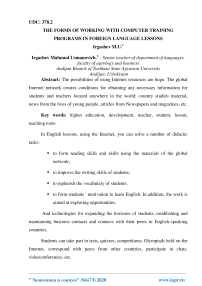The forms of working with computer training programs in foreign language lessons
Автор: Irgashev M.U.
Журнал: Экономика и социум @ekonomika-socium
Рубрика: Основной раздел
Статья в выпуске: 6-1 (73), 2020 года.
Бесплатный доступ
The possibilities of using Internet resources are huge. The global Internet network creates conditions for obtaining any necessary information for students and teachers located anywhere in the world: country studies material, news from the lives of young people, articles from Newspapers and magazines, etc.
Higher education, development, teacher, student, lesson, teaching tools
Короткий адрес: https://sciup.org/140252374
IDR: 140252374 | УДК: 378.2
Текст научной статьи The forms of working with computer training programs in foreign language lessons
In English lessons, using the Internet, you can solve a number of didactic tasks:
-
■ to form reading skills and skills using the materials of the global network;
-
■ to improve the writing skills of students;
-
■ to replenish the vocabulary of students;
-
■ to form students ' motivation to learn English. In addition, the work is aimed at exploring opportunities.
And technologies for expanding the horizons of students, establishing and maintaining business contacts and contacts with their peers in English-speaking countries.
Students can take part in tests, quizzes, competitions, Olympiads held on the Internet, correspond with peers from other countries, participate in chats, videoconferences, etc.
Skilled organization of training increases the desire of students to listen to the teacher, read the textbook, solve problems, and generally come to the teacher for a lesson. From a poor assessment of knowledge will not add. What is more effective? The issue is still debatable.
The forms of working with computer training programs in foreign language lessons include: studying vocabulary; practicing pronunciation; teaching Dialogic and monologic speech; teaching writing; practicing grammatical phenomena.
What are the resources of a modern lesson?
Can a lesson be called modern if such lesson resources as visual and technical teaching tools are not involved? Of course not. With them, a lesson richer, brighter, figurative. With their help, students have an emotional impact, they contribute to better memorization of the material, increase interest in the subject, ensure the strength of knowledge. Without well-thought-out methods and forms of teaching that help involve students in cognitive search, in the work of teaching: they help teach students to actively, independently acquire knowledge, excite their thoughts and develop interest in the subject, a modern lesson is impossible.
Consider the following resources of a modern lesson.
1st place-health saving and developing technologies;
2nd place-designing the educational environment of the lesson using modern pedagogical teaching technologies;
3rd place-design of a comfortable adapted environment (more freedom, emancipation, creativity of students in the lesson);
4th place – material and technical, financial.
If in traditional teaching the combined lesson prevailed, then in the modern system of teaching the teacher uses different types of lesson:
-
- lesson of consolidation of knowledge;
-
- lesson of complex application of knowledge and skills;
-
- lesson of generalization and systematization of knowledge and skills;
-
- lesson of control assessment and correction of knowledge and skills;
-
- models of non-traditional lessons.
Highly effective in my practice are such forms of lesson as:
-
- contests;
-journeys;
-
- integrated lesson.
A modern lesson should form students ' core 21st-century competencies:
-
- communication skills – understanding the other, communicating and creating various effective forms and contexts of oral, written, multimedia and network communication;
-
- creativity and curiosity;
-
- critical and systematic thinking
-
- information and media literacy-ability to find, analyze, process, create information in different forms and different types of media equipment;
-
- interpersonal interaction and collaboration – ability to work in a team, be a leader, perform different roles and responsibilities, be able to empathize, respect different opinions;
The goals and content of education change, new tools and technologies of teaching appear, but with all the diversity – the lesson remains the main form of organizing the educational process. And in order to meet the requirements of the new generation of standards, the lesson must become new and modern!
"Экономика и социум" №6(73) 2020
Список литературы The forms of working with computer training programs in foreign language lessons
- Moiseeva EV The study of foreign languages in the conditions of the development of the Bologna process // All-Russian (with international participation) scientific and practical conference "Innovative competences and creativity in the study and teaching of languages and cultures." - M.: RGSU, 2011.
- Kamynina TP, Moiseeva EV Information culture as the basis of the professional competence of the future specialist // III International scientific and practical conference.- Ufa: Publishing house of the Belarusian State Pedagogical University, 2011.
- G.T. Qodirova. Linguistic and communicative competence in learning language. International conference., 2016, p.441.
- N.A. Odilova., M.U. Irgashev. Information and communication technology in language learning. International conference., 2016, p.439.
- Irgashev M.U. About the problem of motivation of educational activity of students in the conditions of education in the university. Moscow: 2019.


